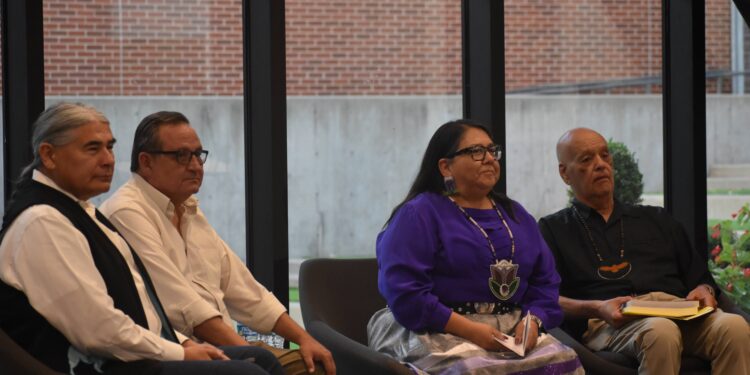TULSA – People from across Tulsa attended a recent discussion at the University of Tulsa on one of the most controversial topics in Indian Country: blood quantum. The Sept. 11 event at 101 Archer, titled “Beyond Blood Quantum: Sovereignty and Tribal Enrollment,” featured a talk with author Norbert Hill Jr. (Oneida); Jennifer Hill-Kelley (Oneida, Kiowa, Comanche), former judge for the Oneida Nation’s Court of Appeals; and Jim Gray (Osage), former Chief of the Osage Nation. Wilson Pipestem moderated the free, public conversation.
Hill, the author of the edited volume “Beyond Blood Quantum: Refusal to Disappear,” spoke of how the issue of blood quantum is, in his opinion, the most important issue that Indigenous people will face in the 21st Century.
“I published two anthologies about blood quantum. It’s a complicated issue. I’ve been in education for a long time, so the books were about community education to try and get people to understand the complexity of this issue.” Hill said.
Hill also made a point of mentioning why holding discussions like this are important. “At the end of the day, we’re trying to figure out how to let people make informed decisions so we don’t terminate ourselves. Our mortality rates are higher than our birth rates, our populations are diminishing, and so we have to figure out how to reinvent ourselves,” Hill stated.
“There’s a sense of urgency there. I believe this is the most important issue Native people are going to face this century, but if we don’t figure this out and find a place for our young people, you know, we won’t survive.”
Another unique presentation was given by Hill-Kelley, who presented evidence via a slideshow of the potential damage blood quantum requirements can do by using the Oneida as an example. The Oneida have a blood quantum requirement of at least one-fourth. This was evidence provided to them by a demographer and analyst.
She pointed out that as time has passed, the number of full-bloods has decreased and the one-half and one-quarter members are increasing. However, due to the blood-quantum requirements, the number of tribal members has stagnated, with most of today’s tribal members being at most one-half or one-quarter.
The Oneida tribe, according to Hill-Kelley, is in danger of “evolving ourselves out” due to the strict blood quantum requirements, as no members below one-fourth can enroll.
Lance Kelley (Mvskoke), one of the organizers, took time to speak about the importance of events like this while also acknowledging that tribes in Oklahoma do have some differences from the Oneida Nation and other tribes in Wisconsin.
“I know it’s a little different perspective here in Oklahoma. In Wisconsin, there’s 11 tribes, while here, there’s 39. It brings another layer of discussion of issues that tribes here in Oklahoma are facing,’ Kelley said.
“The Muscogee Nation is at roughly 100,000 members compared to 17,000 with the Oneida, and the Oneida are one of the largest tribes in their area. And with other issues such as the Freedmen, the number of citizens for the Muscogee Nation is likely to double, so this issue needs to be discussed among many others.”





